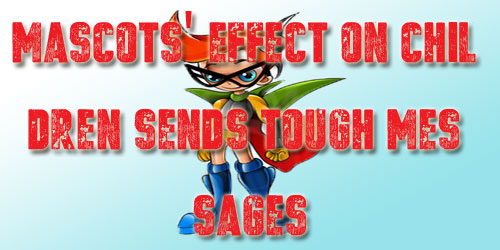 02 Jan 19
02 Jan 19
Mascots' Effect On Children Sends Tough Messages
Kids and Mascot Mental Images
Mascots hold a strong mental image for most people that come in contact with one. But mascots impact on children is much stronger and serious than with any other age group. Youngsters often respond with fondness to mascots that display positive characteristics. A kid may be delighted incidentally a mascot dances or any humorous physical steps the mascot engages in. This is also true if a mascot is the embodiment of something that a child wants his / her parents to buy for them. Mothers and fathers are often susceptible to the marketing market. This is accurate since many products such as toys and games, games, and foods are purchased by parents with respect to their children. Children may be very persistent in making certain their parents choose the most recent cereal or model because a mascot said it had been great. In addition, children that are not yet literate may actually gravitate towards a mascot. Children at this time of development look for photographs or symbols that stand for familiar things to them.
Mascots as Sturdy Symbols
Children may be the most sensitive of most age groups to mascots and their symbology. A grown-up may be able to discern if a product or photo that a mascot is definitely portraying will be worthless, while a kid may see something completely different. Before language skills are strongly shaped, children tend to remember events and people in snapshots like images in their remembrances. 3d Mascot Design Company may be able to grab a place in a child's mind that'll be vivid and keep meaning up for the kid.
Good Vibrations
The positive emotions that mascots elicit from young children are often related to what a mascot does and not just a product itself. Regarding sporting groups the mascots effect on children may be to excite or enthuse them concerning the team or perhaps a game occurring. Not to mention once again, youngsters may be attracted to the mascot on an individual level. Rather than wanting something lauded by a mascot, children might want something that symbolizes the mascot like a: stuffed pet, shirt, pennant flag, or pin. Mascots in of themselves could be easily marketed to children to promote team sales. Furthermore, the mascot may inspire a new generation of fans being realized with the team.
Mascots, Classes, and Self-Image
Elementary schools around college campuses heavily make use of mascots to convey team impression and assist in promoting team heart. Mascots effect on children may be very strong when coping with school mascots. Young children are exposed to the image typically on a daily basis. The school mascot may be present over the schools' outside signal or on the wall or floors of the gymnasium. Also, children who play sports activities may dress in uniforms that have the mascots proudly positioned upon them. Youngsters may come to find out themselves as having many of the same characteristics because the mascot should they participate in group sports. For this reason mascots that encourage a positive image are very very important to school aged kids. Negative mascots impact on children may enhance negative photos of the institution or perhaps perhaps impact a child's self-image.
Responsible Making of Mascots
Since mascots impact on children is significantly profound adults possess a responsibility to create mascots that send out a warm and optimistic message. They have to keep the best interest of kids in mind when making the costume to the mascot. Also, what of this 3d Mascot Design Agency are very important. The individual portraying the mascot comes with an obligation to do something enjoyment and upbeat, without engaging in any behavior which could have a poor or harmful connotation. This will only help paint the workforce or product or service in a confident light with not merely children, but individuals as well.


Comments